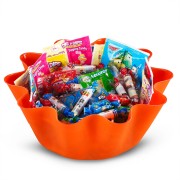In my last blog we discussed how to avoid being helpless when dealing with teens and their cell phones or talking back. (See Don’t Be a Helpless Parent.) This time we’ll tackle two more issues that cause parents to throw their hands up in despair: social media and chores.
or talking back. (See Don’t Be a Helpless Parent.) This time we’ll tackle two more issues that cause parents to throw their hands up in despair: social media and chores.
1. Beyond Twitter and Snapchat Be aware: most teens do not use Facebook as their primary contact with friends. They use Instagram to keep up with friends’ activities (fewer words, more pictures), and Snapchat for conversations. They also use apps like Kik, or Yik Yak to chat with friends–or strangers. Apps such as Kiwi and Whisper go even further and allow users to communicate anonymously. Think of the power that gives middle schoolers to hurt–and be hurt by–one another.
If your teen owns a smartphone, tablet, or iPod (which connects via wi-fi), you need to keep on top of how they’re using it (also see When Is a Calculator Not a Calculator?). Ask your teen to open the apps and show you how they work, and require that they give you passwords (you can open most accounts from you computer). Tell them you won’t be checking all the time, but they should expect you to look in once in awhile. You need to weigh the awkwardness of invading your teen’s privacy against the possibility of them falling victim to–or being tempted to start–cyberbullying, or striking up a relationship with a (possibly dangerous) stranger.
2. Doing Their Share While it’s nice to have your kids help around the house, the benefits go beyond having clean dishes. Children who do chores at home do better in school and grow up to be more successful adults (check out Why Children Need Chores in the Wall Street Journal). You would think that by adolescence, chores would have become a habit, but most parents find themselves in a daily battle to get their kids to do even the most basic of tasks.
After years of being frustrated with my children and tired of hearing myself nagging and complaining, I called a family meeting with my sons (then 10, 12, and 14). I laid out which chores needed to be done daily and let them decide on a fair division. They determined each job would be done for a week, switching on Saturdays. We discussed consequences for not doing chores, and they agreed that being grounded from all screens (computer, TV, video games) for three days was appropriate. For a second or recurring offense, they came up with the Chore Slave, who would be at the parents’ beck and call for an entire Saturday. The key was to involve them in coming up with a plan.
I in turn agreed that if chore didn’t get done in a timely manner, I would do it myself and calmly issue the consequence. This resulted in me sometimes preparing to load the dishwasher, only to be nudged aside by a desperate boy. I never refused his offer, nor did I make a snarky comment like, “About time you showed up.” My goal was for them to do chores without being yelled at, so I graciously left the kitchen without a word.
Just as it was worth your while to teach your preschooler how to tie a shoe or ride a bicycle (both struggles I remember well), it is also critical that you hold your ground on major issues in adolescence. Parents of 13-year-olds have about five years before they graduate from high school. That may seem like a long time to fight the good fight, but you will be preparing them for decades of responsible adulthood.
Hang in there.








